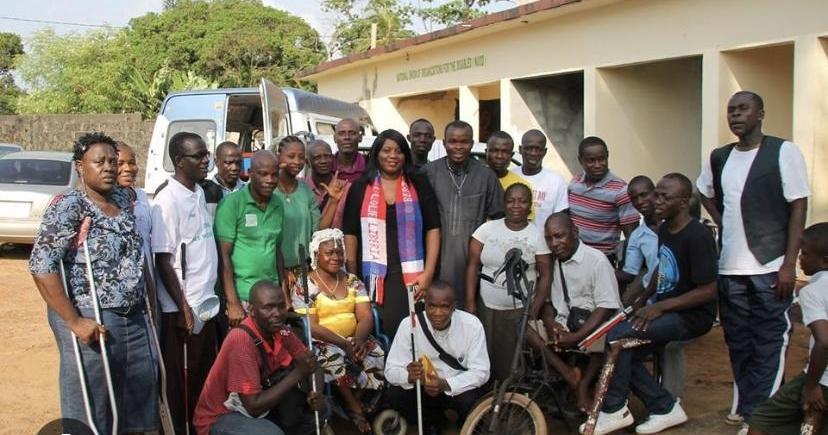Africa-Press – Liberia. The National Union of Organizations of the Disabled (NUOD) has called for an inclusive and participatory approach in establishing the War and Economic Crimes Court (WECC) in Liberia.
NUOD President Peter Flomo stated that several people became crippled and lost eyesight as a result of the civil crisis, which lasted from 1989 to 2003. He emphasized the need to include them in the process by providing sign language interpreters and braille readers to explain the proceedings.
“For us people with disabilities, we were greatly affected,” he said. “When we are discussing cases, we should not forget about persons with disabilities.” Flomo made the plea at the national coordinator meeting at the Office for Leading the Establishment of the WECC in Liberia.
The office, which has pictures of former rebel leaders, including deceased Senator Prince Johnson, on the wall, is inaccessible to people with disabilities, who have difficulty climbing the stairs or being assisted by someone to attend meetings, according to Flomo and his colleagues.
The Liberian Civil Wars, one of Africa’s prolonged conflicts on the continent, lasted for 14 years. The conflict resulted in the deaths of more than 200,000 people, displaced thousands, severely damaged the nation’s infrastructure, and created lasting instability. People living with disabilities were disproportionately affected by the conflict. It is believed that the conflict may have contributed to the increase of people living with disabilities in Liberia from an initially reported 16 percent in 1997 to nearly 20 percent.
The impact of the conflict is seen daily on major streets, where many people with disabilities, often accompanied by young Liberian children acting as guides for their parents, guardians, or relatives, beg for money to make ends meet.
Members of the disabled communities were relieved when President Joseph Boakai announced that his government would establish the War and Economic Crimes Court in Liberia to bring long-overdue justice to victims of the war.
Sylvester Mombo, NUOD Secretary, reechoing Flomo’s concern, said the office should ensure that ram and sign language interpreters are available at all times to assist persons with disabilities attending meetings or visiting the office.
In response, Cllr. Jallah Barbu, WECC-L Executive Director, said they have been working with organizations to provide services, including sign language interpreters and Braille, a system of raised dots that can be felt with the fingertips. He acknowledged funding challenges but promised to ensure these services are available at the office. Cllr. Barbu added that the office’s current two-story structure includes a downstairs television that will broadcast all conference room proceedings from upstairs.
Establishing the WECC gained momentum last year when the House of Representatives and Senate issued a joint resolution calling for the establishment of the court. President Joseph Boakai wasted no time, issuing an executive order to have a physical office and an executive director who will lead the court formation. This office is charged with the mandate of leading the establishment of the War and Economic Crimes Court (WECC) and the National Anti-Corruption Court (NACC).
The weeping light of establishment in the court was vanishing after the deadline for the executive order creating the office was nearing expiration, causing civil society and human rights advocates to issue statements urging President Boakai to renew the order. On April 30, 2025, President Boakai renewed Executive Order No. 131, now Executive Order No. 148, reaffirming his administration’s commitment to establishing the Office of War and Economic Crimes Court in Liberia.
According to the Executive Mansion, this renewal ensures the continued operation of the Office OWECC-L, which was initially created on May 2, 2024, to spearhead the process of justice and reconciliation for atrocities committed during Liberia’s civil conflicts.
Cllr. Jallah Barbu, who served as the OWECC-L Executive Director, will spearhead the investigation, designing and prescribing the methodology, mechanisms, and the process for the establishment of a WECC for Liberia as well as for the establishment of NACC.
According to the President’s Executive Order, the office shall be semi-dependent; the office shall be a grant line item within the budget of the Ministry of State for Presidential Affairs. It shall be funded through a special budgetary process with an annual appropriation of two million United States dollars payable in equal quarter amounts of five hundred thousand United States dollars directly into its bank account at the beginning of each quarter by the ministry of finance and development planning at the beginning of each quarter.
This amount is higher than the previous US$313,000 allocated to the budget by the Boakai administration. However, many transitional justice actors are calling for a length amount that will enable the office to function fully, including employing more staff.
In an email, the U.S. embassy said, “The U.S. Embassy is impressed with how much the WECC has accomplished while acknowledging more work needs to be done to bring long-overdue justice to Liberia and end the culture of impunity.
The Embassy says it is pleased that President Boakai signed the executive order extending the WECC’s mandate to continue functioning effectively. “Since the WECC EO was announced, the U.S. has supported the initiative with three sets of technical visits. We will continue to stay engaged and explore possibilities for future assistance.”
For More News And Analysis About Liberia Follow Africa-Press






